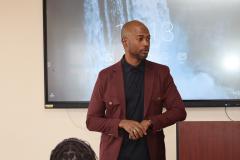Resources
Students
Resume & Cover letter review -
A resume and cover letter are your first opportunity to sell yourself to an employer. PACS provides advising and resources to make your resume and cover letter as effective and professional as possible.
When writing a cover letter remember:
-
The exact title of the position you are seeking. If that’s not possible, then the general type of work for which you are applying.
-
Why you want to work for the company. Remember the company wants to know what you can do for them.
-
A dazzling sample of what you know about the company: product lines, marketing strategies, their quality and quantity of clientele and where they stand among their competitors. For example, “I understand you will be introducing your new robotic CNC widget assembly system in the Australian market this fall. I have several ideas that may help you compete with Intel’s established line.”
-
Personal attributes, or “soft” skills—just don’t overdo it. One or two lines is enough, and keep it as objective as possible: “My peers would tell you I’m self-motivated and energetic, with a sharp eye for detail,” or, “I feel certain my skills in personal client relations, networking and communications will expand your client base and develop strong repeat business, as demonstrated in my position with XYZ company.”
-
Whether you’re willing to travel or relocate. Omit this if it’s not requested or if you are not willing to travel or relocate.
-
Other specifics about yourself or the job. If the posting says: “Include salary requirements” and not salary history, give them a desired salary range and avoid a specific number. For example: “Upper Ksh. 40,000, negotiable, depending on benefits.” You may include this in a letter, but if they ask for salary requirements and salary history, include them on a separate salary history sheet and end the page with Salary requirements are open to negotiation.”
Link to Electronic Resumes
Of course, nothing is perfect, and document scanners can make mistakes. If your resume is scanned from paper into a computer system, letters and sometimes entire words may be read incorrectly. Underlining, italics, and certain typefaces can be misinterpreted, and essential keywords may not be picked up. That’s why emailing has become the most popular way to send your resume to employers, recruiters and large job boards, such as nsoko.com and brightermonday.com. Depending on the requirements of the website, you can send your resume as a fully formatted, MS Word attachment or as part of an email. However, if you’re on a site that asks you to complete an online form, then save your resume in stripped-down text format (that is Plain Text), with no graphics except asterisks (*) for bullets, and all the copy flush left. That way, there’s very little chance of words being misread.
Describe characteristics and industry-specific experience in keywords to accommodate the electronic/computer search process. Use these guidelines to enhance the processing of text-formatted, keyword resumes through the electronic system:
-
Left-justify the entire document.
-
Utilize a basic, Courier font, about 10 or 11 points. Most software will default to Courier when you save a file in text format—it’s the most basic, generic typeface.
-
Avoid tabs.
-
Avoid hard returns whenever possible.
-
Avoid italics, script, underlining, graphics, bold, or shading.
-
Avoid horizontal and vertical lines.
-
Avoid parentheses and brackets.
-
Avoid compressed lines of print. (Typesetting and proportional spacing may cram too much into one line if there’s a long word near the end of the sentence.)
-
Avoid faxed copies, which become fuzzy.
Internships
Internships are an essential part of the college experience. PACS encourages you to complete at least one internship before graduating. Internships provide you the opportunity to test-drive a career field, make contacts, build marketable skills and figure out your likes and dislikes within specific industries. Students with internship experience have better success with their job search or graduate school application process.
Interviews
Interviews are a critical part of the job search, and it is important that you be prepared for an interview with an employer. The Placement and Career Services office has tips, resources, mock interviews, and workshops to help you get ready for interviews.
Examples of questions during interviews:
Answering the question tell me about yourself?
The medium is the message. The interviewer cares less about your answer to this question and more about the confidence, enthusiasm and passion with which you answer it.
The speed of the response is the response. The biggest mistake you could make is pausing, stalling or fumbling at the onset of your answer, thus demonstrating a lack of self-awareness and self-esteem. Next time you’re faced with the dreaded, “Tell me about yourself…” question, try these:
1. “I can summarize who I am in three words.” Grabs their attention immediately. Demonstrates your ability to be concise, creative and compelling.
2. “The quotation I live my life by is…” Proves that personal development is an
essential part of your growth plan. Also shows your ability to motivate yourself.
3. “My personal philosophy is…” Companies hire athletes—not shortstops. This line
indicates your position as a thinker, not just an employee.
4. “People who know me best say that I’m…” This response offers insight into your own level of self-awareness.
5. “Well, I Googled myself this morning, and here’s what I found…” Tech-savvy, fun, cool people would say this. Unexpected and memorable.
6. “My passion is…” People don’t care what you do—people care who you are. And
what you’re passionate about is who you are. Plus, passion unearths enthusiasm.
7. “When I was seven years old, I always wanted to be…” An answer like this shows that you’ve been preparing for this job your whole life, not just the night before.
8. “If Hollywood made a move about my life, it would be called…” Engaging, interesting and entertaining.
9. “Can I show you, instead of telling you?” Then, pull something out of your pocket that represents who you are. Who could resist this answer? Who could forget this answer?
10. “The compliment people give me most frequently is…” Almost like a testimonial, this response also indicates self-awareness and openness to feedback.
Keep in mind that these examples are just the opener. The secret is thinking how you will follow up each answer with relevant, interesting and concise explanations that make the already bored interviewer look up from his stale coffee and think, “Wow! That’s the best answer I’ve heard all day!”
Networking & Outreach
A great way to make connections and find 'hidden' opportunities is to network. Networking is talking to people to gain insight and information into career fields. PACS has tips and information on how to network effectively.
Remember the number-one way to get that new position is through networking. How you present yourself on paper, on the phone and in-person should be clear, strong and most of all, consistent. People are drawn to consistency; it’s calming, comfortable, attractive and memorable. That’s what you must become throughout your job search, and for that matter, your entire career.
According to Ivan Misner, PhD the following traits will make you a “master networker”.
1. Follow up on referrals. This was ranked as the No. 1 trait of successful networkers. If you present an opportunity, whether it’s a simple piece of information, a special contact or a qualified business referral, to someone who consistently fails to follow up successfully, it’s no secret that you’ll eventually stop wasting your time with this person.
2. Positive attitude. A consistently negative attitude makes people dislike being around you and drives away referrals; a positive attitude makes people want to associate and cooperate with you. Positive business professionals are like magnets. Others want to be around them and will send their friends, family and associates to them.
3. Enthusiastic/motivated. Think about the people you know. Who gets the most referrals? People who show the most motivation, right? It’s been said that the best sales characteristic is enthusiasm. To be respected within our networks, we at least need to sell ourselves with enthusiasm. Once we’ve done an effective job of selling ourselves, we’ll be able to reap the reward of seeing our contacts sell us to others! That’s motivation in and of itself!
4. Trustworthy. When you refer one person to another, you’re putting your reputation on the line. You have to be able to trust your referral partner and be trusted in return. Neither you nor anyone else will refer a contact or valuable information to someone who can’t be trusted to handle it well.
5. Good listening skills. Our success as networkers depends on how well we can listen and learn. The faster you and your networking partner learn what you need to know about each other, the faster you’ll establish a valuable relationship. Communicate well and listen well.
6. Network always. Master networkers are never off duty. Networking is so natural to them that they can be found networking in the grocery-store line, at the doctor’s office and while picking the kids up from school, as well as at chamber mixers and networking meetings.
7. Thank people. Gratitude is sorely lacking in today’s business world. Expressing gratitude to business associates and clients is just another building block in the cultivation of relationships that will lead to increased referrals. People like to refer others to business professionals who go above and beyond. Thanking others at every opportunity will help you stand out from the crowd.
8. Enjoy helping. Helping others can be done in a variety of ways, from literally showing up to help with an office move to clipping a helpful and interesting article and mailing it to an associate or client. Master networkers keep their eyes and ears open for opportunities to advance other people’s interests whenever they can.
9. Sincere. Insincerity is like a cake without frosting! You can offer the help, the thanks, the listening ear, but if you aren’t sincerely interested in the other person, he’ll know it! Those who have developed successful networking skills convey their sincerity at every turn. One of the best ways to develop this trait is to give the individual with whom you’re developing a referral relationship your undivided attention.
10. Work your network. It’s not net-sit or net-eat, its net-work, and master networkers don’t let any opportunity to work their networks pass them by. They manage their contacts with contact-management software, organize their email address files and carry their referral partners’ business cards as well as their own. They set up appointments to get better acquainted with new contacts so that they can learn as much about them as possible so that they can truly become part of each other’s networks.
Do you see the trend with these 10 points? They all tie into long-term relationship building, not to stalking the prey for the big kill. People who take the time to build their social capital are the ones who will have new business referred to them over and over. The key is to build mutually beneficial business relationships. Only then will you succeed as a master networker.
Find out how to hone your job search skills with workshops, information sessions, career advising, and other resources at PACS.
-
Will the career's job duties capitalize on my strengths?
-
How successful will I be performing specific job tasks?
-
Will I enjoy doing the tasks?
-
How comfortable - and confident - will I feel doing this job?
-
Will I be happy?
PACS is here to help you in your career process from the moment you enroll at the University. See what steps you should take during each year of your term at USIU to land a job or start up your own business before/ as you graduate.






